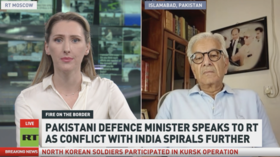The numerous misanthropic warnings about imminent human extinction are encouraging a loathing for humanity itself

The casual way these messages are posed is an unpleasant feature of the 21st century, and it’s apparently a fate we’re bringing on ourselves. Yet in order to solve the world’s problems, we need more, not less, ‘human impact’.
Something within me reacts whenever I come across the increasingly numerous warnings about the possibility of human extinction. I react even more strongly when this possibility is discussed casually in neutral, even philosophical terms. So when I read the title of an essay – ‘Would extinction be so bad?’ – by Roger Crisp, a professor of moral philosophy at Oxford University, I immediately felt provoked.
Also on rt.com When even eco-alarmists realise saying it’s ‘game over’ for the planet is crazy, it’s time to rethink climate change messageAs someone brought up on humanist values, I take it as a given that human extinction is inherently an evil beyond evil. Crisp is not so sure. He writes:
Most people think that such extinction would be bad, in fact one of the worst things that could happen. It’s plausible that the process leading to various forms of extinction, and extinction itself, would be bad for many of us, given that our lives are, overall, good for us and that, all else being equal, the longer they are the better.
He adds:
But it’s also plausible that extinction would be good for some individuals – those in the final stages of an agonising terminal illness, for example, whose pain can no longer be controlled by drugs. This means one key factor in judging the overall value of non-extinction will involve weighing these disparate interests against each other.
In this philosophical cost-benefit analysis, Crisp suggests that before we uphold the value of non-extinction, we should consider all the suffering that might be avoided by the demise of our species.
For me, the act of balancing the finality of extinction with suffering implies the devaluation of human life. There is nothing good about extinction. It is not a value, but the end of values.
Of course, philosophers have every right to ask whatever question they deem relevant; one philosophy blog posed the question, “Would our extinction be good, bad, or in some sense neutral?” But there is something disturbing about the exhortation to think of the value of human survival as an open question.
Also on rt.com Climate alarmism has become a growth industry and the pandemic is making things worse, fueling fears of human extinctionThe casual manner in which the question of extinction is posed is one of the unpleasant features of the 21st century. One of the most fascinating dimensions of the contemporary narrative of extinction is the casual – indeed, promiscuous – manner with which prophecies of global catastrophes are hurled at the public.
According to the green author and Gaia theorist James Lovelock, “before this century is over, billions of us will die, and the few breeding pairs of people that survive will be kept in the Arctic where the climate remains tolerable.”
Even respected scientists feel relaxed about adopting the narrative of doom. In his book, tellingly titled ‘Our Final Hour’, the astronomer Martin J. Rees informed his readers that the odds of humanity surviving to 2100 are about even.
Rees’ odds for avoiding extinction are far better than those given by the world-renowned physicist Steven Hawking. Hawking’s chilling prediction was unambiguous. He stated that “extinction is inevitable.”
These days even celebrities who possess no scientific or academic credentials have embraced the fad for scaremongering predictions. Back in 2013, the activist and former pop star Bob Geldof asserted that humankind might have as little as 17 years until a “mass extinction event.”
Narratives of extinction seamlessly intertwine with a quasi-religious association of the end of the world with human culpability. All of today’s various doomsday scenarios regarding extinction emphasise human responsibility for extinction. Their premise is that the human species is essentially destructive and morally bankrupt. “With breathtaking insolence,” warned Lovelock in his book ‘The Revenge of Gaia’, “humans have taken the stores of carbon that Gaia buried to keep oxygen at its proper level and burnt them.”
Whereas until recently the term ‘human’ conveyed positive connotations, these days it is often associated with negative ones.
The anti-humanist zeitgeist of the 21st century is captured by the term ‘human impact’. In environmentalist literature, IPCC statements, and the media, human impact is associated with pollution, wanton destruction, and the plundering of the planet’s assets.
Over the past 400 years, the human impact on the world, which led to formidable civilisational achievement, was celebrated by Western culture – these days, human ingenuity is regarded ambiguously, or even suspiciously.
As former US Vice President Al Gore puts it, the “power of technologies now at our disposal vastly magnifies the impact each individual can have on the natural world,” causing a “violent destructive collision between our civilization and the Earth.”
Also on rt.com No, the world is not heading for a tech-fuelled apocalypse, Sir Oliver Letwin, unless we keep wallowing in apocalyptic scenariosIt is precisely because human behaviour is coupled with malevolent and destructive behaviour that the extinction of this toxic species can be discussed as if it is not such a big deal. From this perspective, extinction runs in parallel with human culpability.
But does all this doom-mongering about our extinction matter? It certainly does, because its fatalistic narrative distracts people from harnessing their power of imagination to confront the challenges facing the world.
The misanthropic message of extinction encourages loathing for humanity itself. It even incites some to declare that having babies is wrong because it increases the human impact on the environment.
And yet in order to solve the problems that confront us, we need more, not less, ‘human impact’.
Like this story? Share it with a friend!
The statements, views and opinions expressed in this column are solely those of the author and do not necessarily represent those of RT.
















